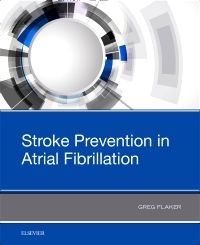Stroke Prevention in Atrial Fibrillation, 1st Edition
Get a quick, expert overview of stroke risks among patients with treated and untreated atrial fibrillation, in addition to best practices for management and treatment of patients with atrial fibrillation to minimize stroke risks. This concise, clinically-focused resource by Dr. Greg Flaker consolidates today’s available information on this timely topic into one convenient resource, making it an ideal, easy-to-digest reference for practicing and trainee cardiologists as well as general practitioners treating and monitoring these patients.
Get a quick, expert overview of stroke risks among patients with treated and untreated atrial fibrillation, in addition to best practices for management and treatment of patients with atrial fibrillation to minimize stroke risks. This concise, clinically-focused resource by Dr. Greg Flaker consolidates today’s available information on this timely topic into one convenient resource, making it an ideal, easy-to-digest reference for practicing and trainee cardiologists as well as general practitioners treating and monitoring these patients.
Key Features
- Covers a broad spectrum of management and treatment options for atrial fibrillation including anticoagulants, surgical and implanted devices.
- Presents information on recent drug trials to keep you up to date with the latest developments.
- Includes guidance on anticoagulation in special situations, such as cardioversion and ablation, in addition to atrial fibrillation treatment in patients with other medical conditions including cancer, major bleeding disorders, and renal or liver disease.
- Chapter on Risk Stratification assists in identifying patients with a high risk of stroke and predicting treatment outcomes.
- Chapter on The New Anticoagulation Clinic overviews best practices for patient education, compliance, follow-up monitoring, and quality assurance to aid in better patient outcomes.
Author Information












